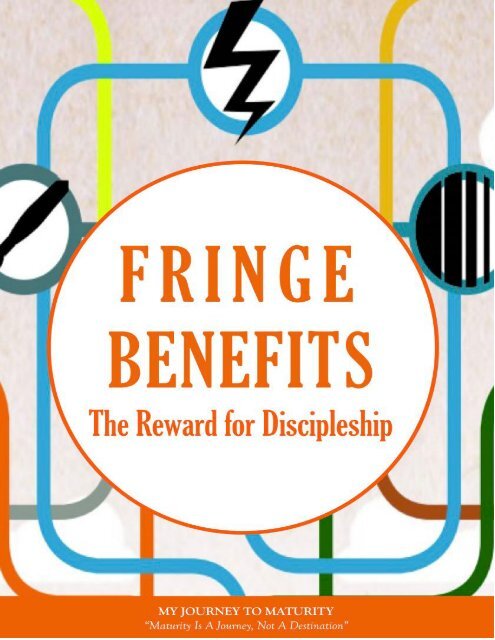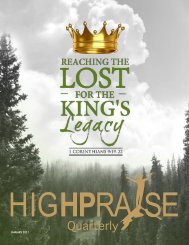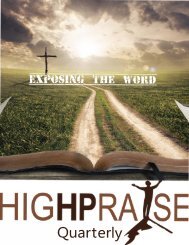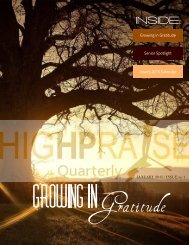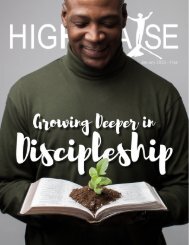Fringe Benefits
You also want an ePaper? Increase the reach of your titles
YUMPU automatically turns print PDFs into web optimized ePapers that Google loves.
<strong>Fringe</strong> <strong>Benefits</strong><br />
Chapter 1. Introduction<br />
Introduction<br />
Bless the Lord, O my soul: and all that is within me, bless his holy name. Bless the Lord, O my<br />
soul, and forget not all his benefits. (Psalm 103:1-2)<br />
Opening Discussion<br />
What are some standard company benefits?<br />
What are some "fringe" or unconventional company benefits?<br />
Why do companies offer fringe benefits to their employees?<br />
Introduction<br />
A company's workers may be pleased with their paycheck and health insurance, but some<br />
companies go above and beyond to make sure their employees love their jobs. These are<br />
called fringe benefits, the extra things that are given by an employer to workers in addition to<br />
their regular pay. These commonly include health insurance, childcare and assistance<br />
reimbursement, personal use of a company-owned vehicle and device, flexible work<br />
schedules and telecommuting.<br />
Observation of Psalm 103:1-2<br />
What do we know about this psalmist and how would you describe his<br />
relationship with God?<br />
We don’t know the circumstances in which it was written, but since David was a<br />
man who knew the grace and deliverance of God many times, it could have<br />
been at many different times of his life.<br />
What does it mean to bless God?<br />
David did not mean this in the sense that a greater bestows a blessing on a<br />
lesser. God is infinitely greater than man, and in this sense man could never give<br />
a blessing to God. David meant this in the sense that it blessed and honored<br />
God when His creatures praised Him and thanked Him appropriately.<br />
What are some reasons to bless and honor God?<br />
In the pattern of Hebrew poetry, David used repetition for emphasis. He then<br />
added an important idea—that this praise and honor to God should be given<br />
unto Him for rationalreasons, not on the basis of mere emotion or excitement.<br />
There are true benefits given by God unto His people, and they must<br />
not forget them. Instead, they should use the remembrance of those things as<br />
reasons to praise.
How would you describe the fringe benefits in verses 3-5?<br />
Summary Conclusion<br />
Some companies are nearly legendary for their fringe benefits. Google, for instance, provides<br />
free meals in the company cafeterias, free doctor's visits, and in-house washers and dryers,<br />
so employees can do a load of laundry while they work. When a Google worker dies, all their<br />
stock vests immediately, and on top of the life insurance payout, their surviving spouse<br />
continues to get half of the employee's salary for the next ten years. And there's an additional<br />
$1,000/month benefit for any of their children. Why does Google and others provide such<br />
generous fringe benefits to their worker? It improves retention by removing barriers so<br />
workers can focus on the things they love, both inside and outside of work.<br />
Whether you work for Google, Facebook or any top tier corporation, the King of fringe<br />
benefits is God. His plan offers an astounding health insurance policy, and no other HMO<br />
could provide to heal your diseases, let alone all of them and for free. He offers lifechanging<br />
counseling sessions through the comfort of the Holy Spirit, and an ongoing<br />
"satisfaction guaranteed or your money back."<br />
Most of importantly, He is the only One who offers life insurance that pays a death benefit to<br />
the insured and accumulates an eternal value. What's great about this deal is that as long as<br />
you are on the King's payroll, then all of these <strong>Fringe</strong> <strong>Benefits</strong> are yours.<br />
Summary Discussion<br />
Oftentimes, employees fail to use the benefits that are offered to them for several<br />
reasons, while others are used completely. Which company benefits are not used<br />
much and which are enjoyed entirely?<br />
As it relates to the benefits of God, are there benefits that are enjoyed more than<br />
others? Why?<br />
In this season of life, which fringe benefits of God do you enjoy most? Why?<br />
Chapter 2. Overtaken by Blessings<br />
Overtaken by Blessings<br />
"Now it shall come to pass, if you diligently obey the voice of the LORD your God, to observe<br />
carefully all His commandments which I command you today, that the LORD your God will set<br />
you high above all nations of the earth. And all these blessings shall come upon you and<br />
overtake you, because you obey the voice of the LORD your God: (Deuteronomy 28:1-13)<br />
Opening Discussion<br />
Have you ever felt overwhelmed by God's blessings? Describe what it felt like.
Why is it so common that someone can have so much and feel so unfulfilled?<br />
Introduction<br />
The best way to understand God’s <strong>Fringe</strong> <strong>Benefits</strong> is the word "favor." The favor of God can<br />
be described as “tangible evidence that a person has the approval of the Lord. When we<br />
favor someone, we connect with her in a way we don’t connect with everyone. This does not<br />
mean that everyone who is prosperous or healthy has found favor with God (Jeremiah<br />
12:1; Psalm 37:7; 73:16). Nor does it mean that those whom the Lord favors will never suffer<br />
difficulties.<br />
Heroes such as Noah (Genesis 6:8), Joseph, Moses (Exodus 32:11; 33:13), and Daniel (Daniel<br />
10:19), were favored of the Lord, but they also struggled with difficulties like anyone<br />
else. Those who are favored of God know that God is with them and that nothing can happen<br />
to them apart from His good purpose (Romans 8:28).<br />
Observation of Deut 28:1-13<br />
"Favor is God’s Elevator"<br />
What's implied by the word, "IF" throughout this passage?<br />
As a literary form, this chapter is similar to ancient treaties between a king and<br />
his people; this is God the King, making a covenant with His people, Israel.<br />
In the ancient Near East it was customary for legal treaties to conclude with<br />
passages containing blessings upon those who observed the enactments, and<br />
curses upon those who did not.<br />
The word “if” looms large. In this chapter, Moses exhorted the nation<br />
with choice. The covenant God made with Israel contained three major features:<br />
The law, the sacrifice, and the choice.<br />
The idea behind the choice is that God was determined to reveal Himself to the<br />
world through Israel. He would do this either by making them so blessed that the<br />
world would know only God could have blessed them so; or by making them so<br />
cursed that only God could have cursed them and cause them to still survive.<br />
The choice was up to Israel.<br />
What were the fringe benefits God promised Israel for obedience? Are there any<br />
spiritual equivalents to these physical benefits?<br />
1. Prominence above other nations: “If you fully obey the Lord your God and<br />
carefully follow all his commands I give you today, the Lord your God will set you<br />
high above all the nations on earth” (Deuteronomy 28:1).<br />
2. Successful cities and farming: “You will be blessed in the city and blessed in<br />
the country” (Deuteronomy 28:3).<br />
3. Blessings of children, food, and livestock: “The fruit of your womb will be<br />
blessed, and the crops of your land and the young of your livestock—the calves<br />
of your herds and the lambs of your flocks” (Deuteronomy 28:4).<br />
4. Protection and power against enemies: “The Lord will grant that the enemies<br />
who rise up against you will be defeated before you. They will come at you from
one direction but flee from you in seven” (Deuteronomy 28:7).<br />
5. Bountiful harvest of food: “The Lord will send a blessing on your barns and on<br />
everything you put your hand to. The Lord your God will bless you in the land he<br />
is giving you” (Deuteronomy 28:8).<br />
6. Set apart as God’s holy people: “The Lord will establish you as his holy people,<br />
as he promised you on oath, if you keep the commands of the Lord your God<br />
and walk in obedience to him” (Deuteronomy 28:9).<br />
7. Feared by other nations: “Then all the peoples on earth will see that you are<br />
called by the name of the Lord, and they will fear you” (Deuteronomy 28:10).<br />
8. Prosperity regarding family, food, and farm livestock: “The Lord will grant you<br />
abundant prosperity in the fruit of your womb, the young of your livestock and<br />
the crops of your ground in the land he swore to your ancestors to give you”<br />
(Deuteronomy 28:11).<br />
9. Appropriate rain and favorable blessing upon their work, including freedom<br />
from debt: “The Lord will open the heavens, the storehouse of his bounty, to<br />
send rain on your land in season and to bless all the work of your hands. You will<br />
lend to many nations but will borrow from none” (Deuteronomy 28:12).<br />
10. Leadership among other people and nations: “The Lord will make you the<br />
head, not the tail. If you pay attention to the commands of the Lord your God<br />
that I give you this day and carefully follow them, you will always be at the top,<br />
never at the bottom” (Deuteronomy 28:13).<br />
“You’ll Soon Discover What It Means To Be Too Blessed To Be Stressed, As You Learn<br />
To Count Your Blessings And Not Your Burdens."<br />
Summary Conclusion<br />
God does not bless us begrudgingly. There is a kind of eagerness about the beneficence of<br />
God. He does not wait for us to come to him. He seeks us out, because it is his pleasure to<br />
do us good. God is not waiting for us; he is pursuing us. That, in fact, is the literal translation<br />
of Psalm 23:6, “Surely goodness and mercy shall pursue me all the days of my life.”<br />
God is never irritable or edgy. His anger never has a short fuse. Instead he is infinitely<br />
energetic with absolutely unbounded and unending enthusiasm for the fulfillment of his<br />
delights. This is hard for us to comprehend, because we have to sleep every day just to cope,<br />
not to mention thrive. We go up and down in our enjoyments. We get bored and discouraged<br />
one day and feel hopeful and excited another.<br />
We are like little geysers that gurgle and sputter and pop erratically. But God is like a great<br />
Niagara — you look at it and think: There is no way this can keep going on forever. That’s the<br />
way God is about doing us good. He never grows weary of it. It never gets boring to him.<br />
Summary Discussion<br />
How do you reconcile God’s fringe benefits with the prosperity gospel and its focus on<br />
material blessings?<br />
How can you be assured that you a still beneficiary of God’s fringe benefits when
experiencing life’s setbacks?<br />
What can we conclude about God based on these verses?<br />
Chapter 3. Crumbs from the King's Table<br />
Crumbs from the King's Table<br />
From there He arose and went to the region of Tyre and Sidon. And He entered a house and<br />
wanted no one to know it, but He could not be hidden. For a woman whose young daughter<br />
had an unclean spirit heard about Him, and she came and fell at His feet. The woman was a<br />
Greek, a Syro-Phoenician by birth, and she kept asking Him to cast the demon out of her<br />
daughter. But Jesus said to her, "Let the children be filled first, for it is not good to take the<br />
children's bread and throw it to the little dogs." And she answered and said to Him, "Yes,<br />
Lord, yet even the little dogs under the table eat from the children's crumbs." (Mark 7:24-30)<br />
Opening Discussion<br />
What does it mean to be ungrateful and what does it look like?<br />
What are the risks of living with a sense of entitlement towards God and others?<br />
Have you ever experienced the saying, “you don’t appreciate what you have until its<br />
gone?"<br />
Introduction<br />
One of the rare trips Jesus took was deep into Gentile country. He went to the coastal cities<br />
of Tyre and Sidon seeking rest and quiet time with His own; anticipating the Cross only a year<br />
away. So, from the frenzy of Galilee, He went into the north. He went beyond the political and<br />
religious jurisdiction of the leaders of Israel to find some privacy but He could not hide.<br />
Upon His arrival, Mark said, a woman whose young daughter had an unclean spirit heard<br />
about you. She came and fell at His feet. She showed up heart broken because<br />
her little daughter was manifesting some kind of immoral conduct brought on by a demon.<br />
Horrible situation; her heart was grieved and broken and she had nowhere to turn. When<br />
people are afflicted with persistent illness, they often try anything to get rid of it. They don’t<br />
necessarily believe the dishonest medical claims of doctors, witchcraft and the like; they just<br />
figure they have nothing to lose, so why not?<br />
Mark also gives a biographical sketch of this woman. One that is certainly worth our<br />
attention. He said, she was a Greek, a Syro-Phoenician by birth, and she kept asking Him to<br />
cast the demon out of her daughter. First of all, she was a woman, that was bad enough. And<br />
then she was a Canaanite, the general category of Gentile. She was corrupted by Baal<br />
worship and Roman culture. This woman had everything going against her. She was an<br />
outcast, a reject. She would have been lower than a Jewish tax collector who sold his soul to<br />
Rome to buy a tax franchise to extort money out of his people. This woman is completely<br />
outside of God’s care, she’s not just any old gentile, she belongs to the most worthless, most<br />
hated group of all. For her to come to Jesus would, in the minds of the Jews, be a discredit
to Jesus for even allowing a woman like that in His presence.<br />
Nonetheless, this woman begged Jesus to heal her little daughter. Jesus asks the Canaanite<br />
woman if it is really proper for the Jewish Messiah to give Jewish things to a Gentile? Jesus<br />
initially denied her request, but in the end He revealed to us a potent lesson about priority,<br />
privilege and pride.<br />
Observation of Mark 7:24-30<br />
What was the significance of Tye & Sydon?<br />
Tye was 20 miles from Capereum. Tye was under the rule of Syria. Jezebel was<br />
from the region of Tye. It was notorious for its wholesale activity in paganism and<br />
idols<br />
Who was this woman was and why approach Jesus?<br />
She was a Greek speaking person but born in Syro-Phonecia. She came<br />
because her daughter was possessed by a demonic spirit.<br />
How did she approach Jesus and does it reveal about her?<br />
She paid homage and gave respect, not because she knew him by relationship,<br />
she only knew him by reputation. She came pleading with Jesus over and over<br />
again. Her last hope for her daughter's rescue could only come by the hands of<br />
Jesus.<br />
How Jesus respond to her request?<br />
Let the children eat first. You don't take the food meant for children and give it<br />
to little dogs.<br />
Was Jesus being unkind or was their something else being communicated?<br />
Why was Jesus so rude and unkind to the woman?<br />
Context and culture would reveal that Jesus was not rude, nor unkind to the woman. To our<br />
21st-century ears, the idea that Jesus would refer to the Gentiles as “little dogs” has the<br />
potential to sound belittling and unkind. When we consider how we often use animal terms in<br />
illustrative ways, you will notice that Jesus’ comments were much more benign.<br />
For instance, suppose a particular defensive end exhibits unyielding tenacity. We might say<br />
he is a “bulldog” when he attacks the quarterback. Or we might say that a person has “puppy<br />
dog eyes.” They need to “call off the dogs” on this one and when you decide that it's best to<br />
end an argument you may say, “let sleeping dogs lie.”<br />
Someone has a lucky day, we might say something like “every dog has its day.” Or if an adult<br />
refuses to learn to use new technology, we might say that “you can’t teach an old dog new<br />
tricks.” You might say someone who has a strong work ethic, they “works like a dog,” When<br />
you've ended a long day of work you would you are "dog tired” We refer to high achiever as<br />
“top dog.” Obviously, to call someone “top dog” would not convey any derogatory<br />
connotations.<br />
In our text, there is a word that modifies the meaning of the word dog. The adjective 'little' is<br />
of great significance to the interpretation. In the Eastern Asia dogs have no owners but run
wild and serve as scavengers. It's an entirely different concept when Jesus speaks of ‘little<br />
pet dogs’ in referring to the Gentiles. These have owners who keep them even in the house<br />
and feed them by throwing them bits from the table.<br />
Jesus was not being rude, He simple applied a house rule that meant, the children of Israel<br />
have first right to God’s fringe benefits. In order to understand Jesus’ statement, must<br />
recognize the primary purpose of the comment. Remember Jesus was is passing through the<br />
land of the Gentiles (Greeks) and was approached by a woman who was not a Jew. While<br />
Jesus’ message would eventually reach the Gentile world, it is evident from the Scriptures<br />
that the Jewish nation would be the initial recipient of that message.<br />
In his account of Jesus’ encounter with the Syrophoenician woman, Matthew recorded that<br />
Jesus said: “I was not sent except to the lost sheep of the house of Israel” (15:24). When<br />
Jesus sent the twelve apostles on the “limited commission,” He told them: “Do not go into<br />
the way of the Gentiles, and do not enter a city of the Samaritans. But go rather to the lost<br />
sheep of the house of Israel” (Matthew 10:5-6). The apostle Paul, in his epistle to the church<br />
at Rome, stated: “For I am not ashamed of the gospel of Christ, for it is the power of God to<br />
salvation for everyone who believes, for the Jew first and also for the Greek” (1:16).<br />
Jesus’ statement to the Syrophoenician woman indicated that the Jewish nation was Jesus’<br />
primary target for during His earthly ministry. If anything Jesus made a point of priority as it<br />
relates to His provision. Any share of Gentile individuals in any of Israel's blessings would<br />
only be incidental. Incidental and not accidental. They were blessed only because of<br />
someone else. They just happened to be were the blessing were handed out.<br />
How did she respond to Jesus and what can we learn about her faith?<br />
She was not response as someone who was offended. She doesn't get uptight, anxious or<br />
angry. She didn’t say, “how dare you speak to me in such a demeaning and condescending<br />
manner.” She said, Yes Lord. You're right, I have no claim. You're right, I am not worthy.<br />
Instead she appealed to another rule for house dogs. A rule is still common today. Its not the<br />
three-second rule that says if food falls from you hand to the floor you have 3 second to pick<br />
it up and eat it. Its the rule that says, “if food were to fall from the table, it was fair game and<br />
open season for the dogs.” There's no three second rule when you have a dog near the table<br />
She's said to Jesus, "Just let a crumb fall from the table in my direction.” She reminds us of<br />
another woman who had no rights or privilege but gained a benefit intended someone else.<br />
In Ruth 2:7 the servants report to Boaz how she had approached them that morning. Ruth<br />
had said, "Pray, let me glean and gather among the sheaves after the reapers.” She does not<br />
demand a handout. She does not presume the right even to the blessing. All she wants to do<br />
is gather up the leftovers after the reapers are done. She was broken but grateful.<br />
Summary Conclusion<br />
When you realize how undeserving you are of goodness of God it will change your behavior. It<br />
will change how you act and react to people. You will stop making unrealistic demands of<br />
those who are closest to you and start looking for ways to serve them without anything in
eturn. It means you will stop playing the victim card and stop using self-pity as a platform for<br />
attention, and start using compassion as your most attractive feature to lead others to Jesus.<br />
It means you will give more than you take. Listen more than you speak.<br />
Instead of complaining about the one thing that is wrong, you will thank God for all the other<br />
things that are right. As a disciple of Jesus, you will start seeing God when you convert<br />
expectation into appreciation. On a relational level, you will notice that people will always do<br />
more than is expected when they feel more appreciated.<br />
One Last Look<br />
"Woe to you, Chorazin! Woe to you, Bethsaida! For if the mighty works which were done in<br />
you had been done in Tyre and Sidon, they would have repented long ago in sackcloth and<br />
ashes. And you, Capernaum, who are exalted to heaven, will be brought down to Hades; for<br />
if the mighty works which were done in you had been done in Sodom, it would have remained<br />
until this day. But I say to you that it shall be more tolerable for the land of Sodom in the day<br />
of judgment than for you.” (Matthew 11:21-24)<br />
The Jews felt so entitled to the benefits of God that they lost sight of God even as He stood<br />
in front them, speaking face to face. So Jesus went to a place the Jews would not dare to go.<br />
Sometimes the best way to appreciate something is to be without it for a while.<br />
Summary Discussion<br />
What does this passage reveal to us about God?<br />
Why is it important to remember that you are not worthy of God’s fringe benefits?<br />
How does gratitude keep you humble in the presence of God and others?<br />
"God's benefits are not incidental or accidental they are all intentional.”<br />
Every blessing you recieved was premeditated in the mind of God. He planned to bless you<br />
and you are blessed on purpose. God has given you more than you deserve even when you<br />
don't deserve it. Be encouraged by Jesus' encounter with the Syro-Phonecian woman so<br />
that you recognize the full worth of God's benefits and resist the impulse of entitlement.<br />
Chapter 4. The Benefit of Future Grace<br />
(Part 1)<br />
The Benefit of Future Grace (Part 1)<br />
And we know that all things work together for good to those who love God, to those who are
the called according to His purpose. (Romans 8:28)<br />
Opening Discussion<br />
Has God ever guaranteed anything to us that we cannot earn? If so, what? If not, why<br />
not?<br />
What is grace and how do you know you’ve received it?<br />
Can someone have too much or too little grace?<br />
Introduction<br />
Thus far we learned that God will not bury us with burdens, but He will overtake us with<br />
blessings. We’ve also discovered that our benefits are sustained by having a humble attitude<br />
toward God. Each benefit from God is directly linked to a promise of God. The Bible has over<br />
7,000 promises from God to you. Promises of success, confidence, health, prosperity,<br />
strength, wisdom and more. In each promise, God pledges that something will (or will not) be<br />
done or given or come to pass. These are not flippant, casual promises such as we often<br />
make; these promises of God are rock-solid.<br />
As we’ve learn, all promised aren’t created equal. God's promises fall into two categories,<br />
unconditional and conditional. An unconditional promise is one that God offers and<br />
guarantees without any "ifs" included. An example of an unconditional promise would be the<br />
one God made to Noah after the Great Flood that destroyed almost all of mankind. God<br />
promised to never destroy the earth again by water. Noah didn't have to do anything to<br />
receive the promise, and he didn't have to maintain any standards to continue the promise.<br />
God gave the promise with no strings attached.<br />
In our lesson today, we will focus on a conditional promise. These are the promises that<br />
require the recipients to do something to obtain the benefit. Such a conditional promise is<br />
found in Romans 8:28.This is one of the most important and most treasured verses and<br />
promises in the Bible. In this lesson, we will pulling apart the critical pieces in these twentyfour<br />
words for understanding and embracing our benefit of future grace.<br />
Observation of Romans 8:28a<br />
What Does ‘Good’ Mean?<br />
“We do not know what to pray for as we ought” (Romans 8:26). But there is<br />
something we do know. What do we know? We know that all things work<br />
together for good for those who love God (Romans 8:28). What does “good”<br />
mean? First, it is “good” to be conformed to the image of God’s Son (Romans<br />
8:29). Second, being conformed to him, we will be in a position to see and<br />
praise the One who goes before us and is lifted above us (Romans 8:29). The<br />
last good of Romans 8:28 is our final glorification (Romans 8:30).<br />
What Are the ‘All Things’?<br />
All things; positive or negative, painful or pleasurable, are by his design, and<br />
sustained by him, and for his glory (Romans 11:36). God will work all things<br />
according to the counsel of his will, and his will is for our good (Ephesians 1:11–
12). Everything we need in this life will be ours, including painful things that are<br />
necessary to bring us to glory (Romans 8:31–34). Even death is yours. Death<br />
itself will serve our ultimate, lasting life (1 Corinthians 3:21–23). All our sufferings<br />
will serve our future glory (Romans 8:18–21). All of our groaning will work<br />
together for our good (Romans 8:23–25). At least one way this happens is that<br />
suffering produces hope (Romans 5:3–5).<br />
The Bible makes promises to those who love God. But how do we know if we<br />
do? Who are “those who love God?"<br />
“Those who love God” must be all Christians because Romans 8:29 assumes<br />
they’re all believers (all are foreknown and predestined). This same idea is<br />
confirmed in 1 Corinthians 2:9–10, where Paul is clearly talking about all<br />
Christians, not some smaller group of them. The evidence that you’ve been<br />
known (or foreknown) by God is that you love God. (1 Corinthians 8:3)<br />
Why does Paul use ‘love’ here, and not trust or believe or follow?<br />
The Holy Spirit delivers us from hostility to God, and replaces it with love (or a<br />
desire to please him). (Romans 8:7–8) We cry, “Abba! Father!” by the Holy Spirit.<br />
It is a heartfelt cry of affection and adoration, not indifference. (Romans 8:15)<br />
God’s glory is so precious to us that we can consider all our suffering not worth<br />
comparing with it (Romans 8:18). Therefore, all who truly trust God do love him<br />
— desire Him, delight in Him, and treasure Him above all else. And all who<br />
truly love God trust him.<br />
Summary Conclusion<br />
If you live inside this promise, your life is more solid and stable than Mount Everest. Nothing<br />
can blow you over when you are inside the walls of Romans 8:28. Outside Romans 8:28, all is<br />
confusion and anxiety and fear and uncertainty. Outside this promise of God’s allencompassing<br />
future grace, there are straw houses of drugs and pornography and dozens of<br />
futile diversions. There are slat walls and tin roofs of fragile investment strategies and fleeting<br />
insurance coverage and trivial retirement plans. There are card-board fortifications of<br />
deadbolt locks and alarm systems and antiballistic missiles. Outside are a thousand<br />
substitutes for Romans 8:28.<br />
Once you walk through the door of love into the massive, unshakable structure of Romans<br />
8:28, everything changes. There come into your life stability and depth and freedom. You<br />
simply can’t be blown over anymore. The confidence that a sovereign God governs for your<br />
good all the pain and all the pleasure that you will ever experience is an incomparable refuge<br />
and security and hope and power in your life.<br />
Summary Discussion<br />
How does Romans 8:29–30 relate to Romans 8:28?<br />
Do you see a connection between the promise of 8:28 and the promise of 8:29–30?<br />
Chapter 5. The Benefit of Future Grace
(Part 2)<br />
The Benefit of Future Grace (Part 2)<br />
And we know that all things work together for good to those who love God, to those who are<br />
the called according to His purpose. (Romans 8:28)<br />
Opening Discussion<br />
1. What does it mean to be called by God?<br />
2. How does God call a person, why does he call and what happens to those who are<br />
called?<br />
3. How would you define the “good life?”<br />
4. What is the relationship between the blessings of God and the purpose of God?<br />
Introduction<br />
A quick look at Facebook and Twitter shows how many people today feel #blessed. In our<br />
social-media world, saying you’re blessed can be a way of boasting while trying to sound<br />
humble. As Christians we use that term too, of course. We pray God will bless our family. We<br />
attribute our undeserved gifts to “God’s blessings.” We talk about ministries being blessed.<br />
But what does it really mean? How should we understand the blessing of God? For believers,<br />
is the blessed life synonymous with the successful life? Is it the Christian version of the good<br />
life? A loving marriage, obedient children, a vibrant ministry, a healthy body, a successful<br />
career, trusted friends, financial abundance, if these are the characteristics of a blessed life,<br />
then having all of them should translate into an extraordinarily blessed life. But does it? If<br />
someone had all those things, would they be extraordinarily blessed?<br />
Rather than turning to God, they might feel self-sufficient and proud. Perhaps a bit smug and<br />
self-righteous. After all, their hard work would be yielding good fruit. Moreover, they wouldn’t<br />
need to cry out to God for deliverance; everything would already be perfect. They wouldn’t<br />
need to trust God; they could trust in themselves. They wouldn’t need God to fill them; they<br />
would already be satisfied. Our desire for God is driven by our need. And it is in the areas of<br />
loss where we feel our need most intensely. Unmet desires keep us on our knees. Deepen<br />
our prayer life and brings us back to the promise of Romans 8:28.<br />
Observation of Romans 8:28b<br />
When God calls a man or woman, what happens?<br />
The call in Romans 8:28 and 8:30 must be more than the preaching of the<br />
gospel because not everyone who hears believes and is justified. The general<br />
call is the preaching of the gospel (1 Corinthians 1:23), but there is a call within<br />
the general call (1 Corinthians 1:24). The specific call creates sight or saving<br />
faith.<br />
What is the relationship between our love and God’s calling?
We must love God (our side of the equation), and God calls us (God’s side of the<br />
equation). (Romans 8:28–30). Your faith, fueled by a love for God, was created<br />
by God’s call. Therefore, your love for God was not created by you, and it is not<br />
sustained by you. It was created and is sustained by God.<br />
What is the purpose of God in this verse?<br />
God’s purpose in our salvation is an eternal purpose (“before the ages began”),<br />
and it is consistent with His calling. (2 Timothy 1:9).<br />
Summary Conclusion<br />
There is no hint of material prosperity or perfect circumstances in any New Testament<br />
reference. On the contrary, blessing is typically connected with either poverty and trial or the<br />
spiritual benefits of being joined by faith to Jesus. According to the Key-Word Study Bible,<br />
“The Greek word translated blessed in these passages is makarioi which means to be fully<br />
satisfied. It refers to those receiving God’s favor, regardless of the circumstances” (emphasis<br />
added). What is blessing, then? Scripture shows that blessing is anything God gives that<br />
makes us fully satisfied in Him. Anything that draws us closer to Jesus. Anything that helps<br />
us relinquish the temporal and hold on more tightly to the eternal. And often it is the struggles<br />
and trials, the aching disappointments and the unfulfilled longings that best enable us to do<br />
that.<br />
Pain and loss transform us. While they sometimes unravel us, they can also push us to a<br />
deeper life with God than we ever thought possible. They make us rest in God alone. Not<br />
what we can do or achieve for him. And not what he can do or achieve for us. God’s greatest<br />
blessing always rests in God himself. When we have that, we are truly #blessed.<br />
In pain and loss, we long for His Presence. We long to know that God is for us and with us<br />
and in us. Great families, financial wealth, and good health are all wonderful gifts we can<br />
thank God for, but they are not his greatest blessings. They may make us delight, not in God,<br />
but in His gifts. Be encouraged. If you love God, you have at least two reasons to trust His<br />
future grace that is working all things for your good: (1) God called us sovereignly to Himself<br />
and created our faith in and love for him. (2) This call itself is rooted in an eternal purpose to<br />
bring us into conformity with His Son and to bring us to glory. It cannot fail.<br />
Summary Discussion<br />
Read through Romans 8:28–30. Write down everything you learn about the call of God<br />
in these verses.<br />
Read 1 Corinthians 1:22–24. How do those verses help you understand the call of<br />
God? When this call occurs, what happens? Do you see two different calls happening<br />
in this passage?<br />
Look back over Romans 8:28–30. Try to define the relationship between God’s call on
your life and your love for God. How do those two actions — one God’s and one ours<br />
— relate to each other?<br />
Chapter 6. The Benefit of Blessed<br />
Assurance<br />
The Benefit of Assurance<br />
And this is the testimony: that God has given us eternal life, and this life is in His Son. He who<br />
has the Son has life; he who does not have the Son of God does not have life. These things I<br />
have written to you who believe in the name of the Son of God, that you may know that you<br />
have eternal life, and that you may continue to believe in the name of the Son of God. (1 John<br />
5:11-13)<br />
Opening Discussion<br />
Have you ever had doubts about your relationship with God?<br />
What circumstance led to those moments or season of doubt?<br />
Introduction<br />
"Blessed assurance, Jesus is mine. O, what a foretaste of glory divine." This is a verse in one<br />
of my favorite classic church hymns; Blessed Assurance. There is a sublime sense of joy that<br />
comes with assurance. As a child, and even now as an adult, our faith increases and<br />
decreases over time. Sometimes, it seems so secure that it isn’t worth a second thought.<br />
Other times, it is desperate and weak, and all we can do is throw ourselves at God’s mercy.<br />
However, in spite of our waning faith, God gives us the benefit of “full assurance” (Hebrews<br />
10:22). It is a fringe benefit only to His children, the source of deep peace and consolation,<br />
and He wants us to have it.<br />
Many look for the assurance in the wrong places. We tend to seek assurance of salvation in<br />
the things God is doing in our lives, in our spiritual growth, in the good works and obedience<br />
to God’s Word that is evident in our Christian walk. While these thing can be evidence of<br />
salvation, they are not what we should base the assurance of our salvation. Rather, we<br />
should find the assurance of our salvation in the objective truth of God’s Word. We should<br />
have confident trust that we are saved based on the promises God has declared, not<br />
because of our subjective experiences.<br />
Observation of Romans 2:24<br />
What is the meaning of testimony in this verse?<br />
John, in the previous verse, just told us how serious the matter of receiving the
testimony of God is. Now he will tell us what this testimony is. That God has<br />
given us eternal life, and this life is in His Son: This is God’s essential message<br />
to man; that eternal life is a gift from God, received in Jesus Christ. He who has<br />
the Son has life; he who does not have the Son of God does not have life. It is all<br />
about Jesus, and living in Jesus is the evidence of eternal life.<br />
What was John’s purpose for writing this?<br />
These things I have written to you who believe, that you may know that you have<br />
eternal life. In stating the message so plainly, John hopes to persuade us to<br />
believe. Even if we already believe, he wants us to know that you have eternal<br />
life, so we can have this assurance, and so that you may continue to<br />
believe. That you may know that you have eternal life: John’s confidence is<br />
impressive. He wants us to know that we have eternal life. We can<br />
only know this if our salvation rests in Jesus and not in our own performance. If<br />
it depends on me, then on a good day I’m saved and on a bad day, I don’t really<br />
know. But if it depends on what Jesus has done for me, then I can know.<br />
Summary Conclusion:<br />
This assurance is better than anything money can buy. A billionaire, without that blessed<br />
assurance, breathing his last breathe, would give his entire fortune to have what we've been<br />
given. The separation between the unbelieving billionaire and a child of God is too vast to<br />
imagine. For the Christian who has assurance, no worldly fortune could ever be enough to<br />
purchase this benefit (John 10:28). A Chrisitian who passes without the benefit of worldly<br />
riches will step into a glorious kingdom where there is untold beauty, worship, love, and joy.<br />
When you understand blessed assurance, you will accept it because it is the greatest<br />
fringe benefit you will ever receive. Assurance gives us peace with God and the peace of<br />
God. Our assurance of salvation does not come from a confidence in some subjectively<br />
measured experience. Rather, our assurance comes from a growing confidence in the saving<br />
work of Jesus that purchased His great promises for us (2 Peter 1:4 ) and His power to keep<br />
them.<br />
Summary Discussion:<br />
Why does God cultivate assurance through testing and hardship?<br />
How can you live differently when you have assurance of salvation through Christ?


